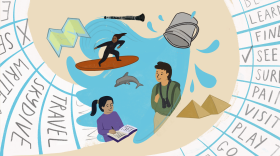
Jane Lindholm
Host and Executive Producer, But Why and Special ProjectsJane Lindholm is the host, executive producer and creator of But Why: A Podcast For Curious Kids. In addition to her work on our international kids show, she produces special projects for Vermont Public. Until March 2021, she was host and editor of the award-winning Vermont Public program Vermont Edition.
Jane joined Vermont Public in 2007 to expand Vermont Edition from a weekly pilot into the flagship daily newsmagazine it is today. She has been recognized with regional and national accolades, including several Murrow, PRNDI and GRACIE awards. In 2016 she started the nationally recognized But Why, which takes questions from kids all over the world and finds interesting people to answer them.
Before returning to her native Vermont, Jane served as director/producer for the national business program Marketplace, based in Los Angeles. Jane began her journalism career in 2001, when she joined National Public Radio (NPR) as an Editorial/Production Assistant for Radio Expeditions, a co-production of NPR and the National Geographic Society. During her time at NPR, she also worked with NPR's Talk of the Nation and Weekend Edition Saturday.
Jane graduated from Harvard University with a B.A. in Anthropology and has worked as writer and editor for Let’s Go Travel Guides. She has had her photojournalism picked up by the BBC World Service and her reporting has aired on NPR, APM and the CBC. Her hobbies include photography, running, beekeeping and wandering the woods and fields of New England. She lives in Addison County with her family.
-
Why did the dinosaurs go extinct? Many of you have learned about the meteorite that scientists say hit the earth 66 million years ago and killed off many dinosaur species. But some dinosaurs survived, and the birds you see flying around today are their direct descendants! In this episode we trace the connection between modern birds and prehistoric dinosaurs. Other questions include:Were any dinosaurs mammals?How did bird dinosaurs survive?Are crocodiles related to dinosaurs?Did dinosaurs have feathers? How do we know?Did all dinosaurs lay eggs?Our guest is Dr. Emily Bamforth, curator of the Philip J. Currie Dinosaur Museum in Alberta, Canada.
-
Why are brothers and sisters so annoying? Why do siblings often look a lot alike? Why do siblings fight? Can your sister be your best friend? Why do we fight with our siblings even if we love them? But Why takes a look at the sibling relationship with Susan Dominus, author of The Family Dynamic.
-
Why are rabbits called bunnies? Why do they have fur? Why do bunnies have puffball tails? Why do rabbits have eyes on the sides of their heads? Why do rabbits hop? Our guest is Margo DeMello, professor of anthrozoology at Carroll College in Montana. She’s also a rabbit rescuer and rehabilitator who is currently caring for 12 rabbits in her home!
-
How does memory work? Why can’t we remember things that happened when we were babies? Why do we forget? Why are some people forgetful? Why do elephants have such good memories. What’s this episode about? I forgot! Oh yeah, how does our memory work! Our guest is Dr. Nick Turk-Browne, professor of psychology at Yale University.
-
Have you ever heard of a bucket list? That’s an expression people sometimes use that means something big you want to do or see or accomplish in your lifetime! For our last episode every year, we like to turn things around and WE ask a question for YOU to answer! Our 2025 end-of-year question is for you to tell us what’s on your bucket list–what’s something really big that you hope to accomplish at some point in your lifetime? Listen to this episode for things to add to your bucket list!
-
Have you ever heard a fox scream at night and thought it was a human? And why, when goats bleat, do they sometimes sound like human babies? Animals can sometimes make similar noises but not because they’re feeling the same things. It often has more to do with how similar the sound-making structures in our bodies are! In this bonus episode, we learn about how animals make sounds and how their vocal folds work with Dougie Pickles, host of the sleepy adventure podcast Cozy Critters.
-
On a rainy, windy day, But Why hopped on a ferry and headed to Governors Island in New York City with one thing on our minds - oysters! We met up with Mike McCann of the Billion Oyster Project to learn more about these very special bivalves. How do they get their shells? How long do they live? What do oysters eat and who eats them? Why do people eat oysters without cooking them?
-
How do musical instruments make their sounds? Why do people play music in the first place? What’s a viola bow made out of? How are musical instruments made? How much do professional musicians practice? Three musicians from the Vermont Symphony Orchestra joined families at the Vermont Public Studios for a special live episode during our Curious Kids Day live events. We hear from Melissa Meilens on flute, Katie Oprea on oboe and Stefanie Taylor on viola.
-
The Macy’s Thanksgiving Day Parade is an American tradition. It’s been going since 1924. This year marks the 99th parade (it took three years off during World War II). It’s famous for elaborate floats and huge character balloons that bob above the streets as the parade marches forward. Millions of people watch the parade live in New York City each year, but many many more watch it on TV. And some of you have questions! How do they make such big balloons for the parade and how do they choose which characters to feature? And how do they hold onto the balloons with such tiny strings? And, more generally, how do balloons float? What’s helium got to do with it? But Why visits the Macy’s Studio workshop in New Jersey to see how the magic happens!
-
What’s your favorite color? Where do colors come from?Why do people see colors? Does everyone see colors the same way? How many colors are there in the world? We learn about colors with Kassia St. Clair, the author of a book called The Secret Lives of Color. We talk about the science of color as well as all the ways color and culture are intertwined.










